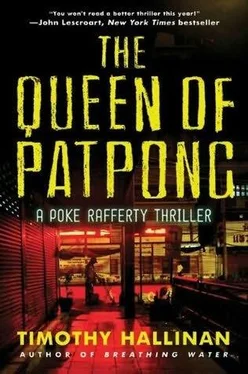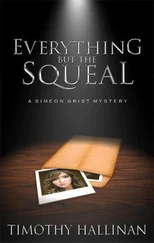Timothy Hallinan - The Queen of Patpong
Здесь есть возможность читать онлайн «Timothy Hallinan - The Queen of Patpong» весь текст электронной книги совершенно бесплатно (целиком полную версию без сокращений). В некоторых случаях можно слушать аудио, скачать через торрент в формате fb2 и присутствует краткое содержание. Жанр: Криминальный детектив, на английском языке. Описание произведения, (предисловие) а так же отзывы посетителей доступны на портале библиотеки ЛибКат.
- Название:The Queen of Patpong
- Автор:
- Жанр:
- Год:неизвестен
- ISBN:нет данных
- Рейтинг книги:5 / 5. Голосов: 1
-
Избранное:Добавить в избранное
- Отзывы:
-
Ваша оценка:
- 100
- 1
- 2
- 3
- 4
- 5
The Queen of Patpong: краткое содержание, описание и аннотация
Предлагаем к чтению аннотацию, описание, краткое содержание или предисловие (зависит от того, что написал сам автор книги «The Queen of Patpong»). Если вы не нашли необходимую информацию о книге — напишите в комментариях, мы постараемся отыскать её.
The Queen of Patpong — читать онлайн бесплатно полную книгу (весь текст) целиком
Ниже представлен текст книги, разбитый по страницам. Система сохранения места последней прочитанной страницы, позволяет с удобством читать онлайн бесплатно книгу «The Queen of Patpong», без необходимости каждый раз заново искать на чём Вы остановились. Поставьте закладку, и сможете в любой момент перейти на страницу, на которой закончили чтение.
Интервал:
Закладка:
As tall as the Stork.
The boy bringing up the end of the line proudly tows a small bright pink suitcase. It has wheels, and they get snagged in the holes that pit the road every few feet, so the boy doing the honors has to yank the wheels free every time and then catch up with the parade. In the background, at the village's edge, the dented orange taxi that first drew the children's attention finishes a jerky turnaround-back and forth, back and forth, trying not to bump two rickety houses it could bulldoze flat without denting its fenders-and bounces over the rutted track leading back toward the railroad station, kicking up a plume of reddish dust that drifts across the village in a dry parody of fog.
The woman the children follow shimmers like an exotic tropical bird that's landed among the rice sparrows. She wears a loose blouse the color of sunset-silk, from the way the air drapes and redrapes it-and a short, tight, glittery black skirt. Shiny high heels in a leopard-skin pattern puncture the dust of the road between the houses. The woman's skin, paler than Kwan remembers it, looks polished, as though it's been slowly rubbed smooth. The highlights in her shaped and tapered hair, bright enough to have been shellacked, are almost blinding in the slanting sun. She pays no attention to the kids, but as she passes Kwan's house, she looks up and smiles.
Kwan feels like she's been caught spying. She pulls back, ducking behind the damp clothes that hang on the line strung above the deck around her sagging wooden house. The deck and the house are raised about a meter above the dirt to keep the floors dry in the rainy season. Kwan reads the name of the rice company printed on the inside of one of her mother's dresses before she realizes how rude she's being, and she pushes aside the stiffening and now-dusty clothes and does her best to return Moo's smile.
"We should talk while I'm here," Moo says, looking up at Kwan Then, as though she's remembering something, she says, more politely, "Are you well? Have you had rice yet?"
"I'm fine, thank you," Kwan says. She knows she's blushing. Moo has never once spoken to her in the four summers since she went down to Bangkok, never even seemed to notice her. Now that they're speaking, Kwan has no idea what to say.
"Straighten up," Moo says severely. "You're tall. You can't fool anybody by bending over like that. You just look crippled. Stand up and be proud of it. Some men will like it."
Now Kwan's face is aflame. This is her least favorite topic. "Nobody likes it," she says. "I look like a giraffe."
Moo nods, but she's not listening. The nod is polite dismissal. "Maybe tonight," she says. "We'll talk." She starts to move away but stops, and some of the kids who were already in motion behind her bump into each other. She reaches up to her left ear and fiddles with something for a moment. Then she mimes a little underhand throwing motion, and Kwan brings her hands up, and on the second pass Moo actually does throw something, something that flashes blue in the air as it flies and then lands, small, hard, and sharp, between Kwan's panicky, hurriedly clasped hands. An earring.
A sapphire earring.
The stone is the size of a small raisin, dark blue as the new-moon sky, mounted on a straight gold post. A little tangle of gold wire that looks like one of the symbols in written music that Kwan has seen in school-a clef, the bass clef, for low music, Teacher Suttikul calls it-is stuck on the post, where it secures the earring to the lobe and holds it in place. The earring probably cost more money than her father earns in two years.
Kwan says, "Oh, Moo. I can't-"
"Not Moo," the woman says, and her smile goes muscular, just something her face is doing, with nothing behind it. "Not Moo anymore. My name is Nana."
"Nana," Kwan corrects herself. She knows that. Moo has called herself Nana for years now, ever since the first time she came back. Kwan wants to kick herself. She never gets anything right. Tall, awkward, tall, stupid, tall.
"Put it on," Nana says. "After we talk, I'll give you the other one."
"No, no. You don't need to give me anything just to talk to me. I'm happy to-"
"When somebody gives you something, you take it," Nana says, without smiling. "They don't teach you that in school, so I've made this whole long trip here to say it to you. And this way we'll be sure to talk." She makes a little side-to-side bye-bye wave, more brisk than friendly, checks the location of the child hauling her suitcase, and resumes her procession down the red ribbon of dust that separates the run-down houses on Kwan's side of the village from the run-down houses on the other side. The children are towed into motion behind her, like ducklings.
Kwan tears her eyes from the blue stone in her hand to Moo's leopard-spotted shoes. Yellow and black, impossibly pointed in the toe, they send thin yellow straps spiraling almost all the way up to the knee. They seem to have been made by someone who has never seen a foot. How does Moo-Nana-how does Nana walk in them? The heels must be five inches high. The village road is uneven, with holes everywhere, hidden beneath the dust. How does she keep from breaking her ankles?
Something warm seems to flood through Kwan's veins. Unconsciously, she slides her foot out of her rubber flip-flop, a man's size medium, worn cardboard-thin beneath the ball of her foot, and points her toes straight down. How would it feel to wear shoes like that?
Tall is how it would feel. Even taller than she is now. Tall enough to talk to birds. Tall enough to see the sun rise half an hour before anybody else, to eat the tender top leaves of trees. Tall enough to have men tilt their heads way back to look up at her and then grab their necks in pretended pain. And then laugh.
Of course, they already do that.
The parade is long gone, and the street is settling into the slow cooling that ushers in the evening. The warped, mismatched wood of Kwan's house, and of the houses on both sides of the street, begins to rehearse its little orchestra of groans and creaks, just a tune-up for the ensemble piece of contracting and settling to come, when the sun is down. Her house makes so much noise that it seems to Kwan it must shrink two or three inches every evening. She wishes it were that easy for people.
Longer shadows, stiller air. The late sun scatters reddish light across the tops of the trees. Some people are finishing the sleep in which they hid from the day's hottest time, and a few voices, pitched low in conversation, create a sort of ribbon of sound, a little like the murmur of the stream behind the houses during the months it flows-here now, gone a moment later, then back again. No words, just voices, tones, laughter, lazy emotion. Across the street, above a sprawled dog, a sparse column of flies spirals slowly, its members probably half asleep on the wing. A sudden sharp smell of garlic tossed into hot oil.
The weathered wood of the railing beneath her elbows is warm and smooth, but her back hurts. The railing, comfortable for everyone else to lean on, is too low for her. The tops of the village's doors, some of them, are too low for her. When the young people gather in the evening to watch the village's one television, Kwan is pushed to the rear so people don't grumble. And she can barely see the screen from back there. She has a suspicion, growing stronger over the past few years, that she needs glasses. Glasses. They might as well be diamonds for all the likelihood she'll ever get them.
If it weren't for Teacher Suttikul seating her in front of the class and to the side, she wouldn't be able to read the blackboard either. The other kids call her desk "the Stork's nest."
School. The thought cuts through her like a red-hot knife.
The blue earring that Moo-Nana-threw to her is punching a hole in her palm, and she relaxes her fist. She doesn't dare put it in her ear. Her father would probably rip it out to sell it.
Читать дальшеИнтервал:
Закладка:
Похожие книги на «The Queen of Patpong»
Представляем Вашему вниманию похожие книги на «The Queen of Patpong» списком для выбора. Мы отобрали схожую по названию и смыслу литературу в надежде предоставить читателям больше вариантов отыскать новые, интересные, ещё непрочитанные произведения.
Обсуждение, отзывы о книге «The Queen of Patpong» и просто собственные мнения читателей. Оставьте ваши комментарии, напишите, что Вы думаете о произведении, его смысле или главных героях. Укажите что конкретно понравилось, а что нет, и почему Вы так считаете.












